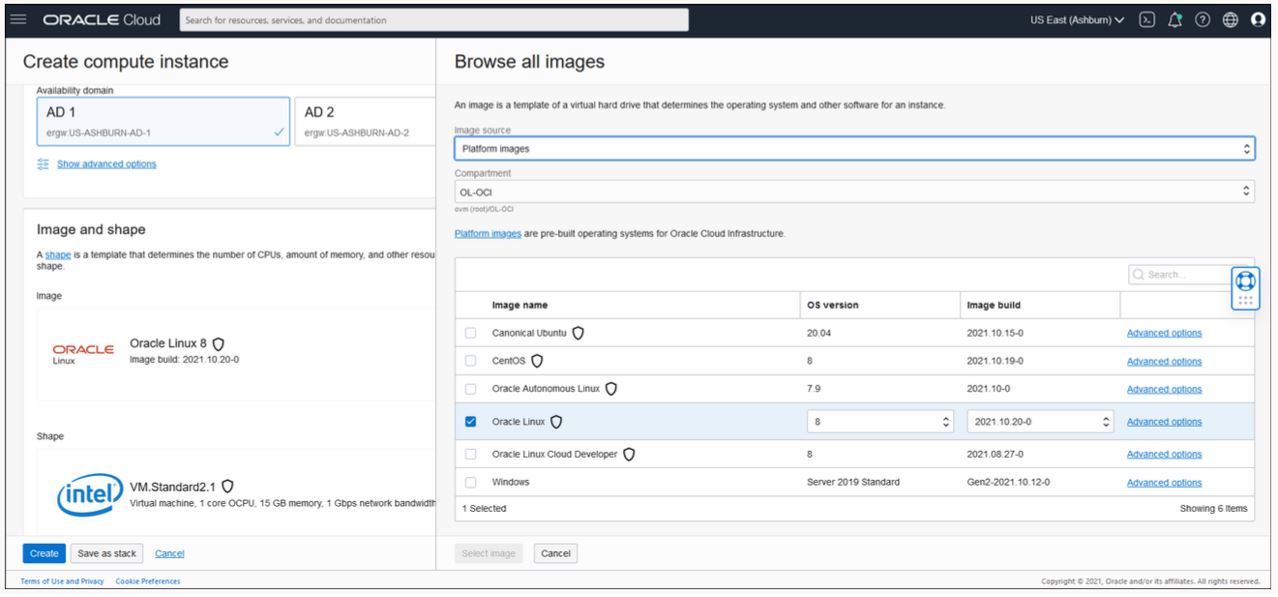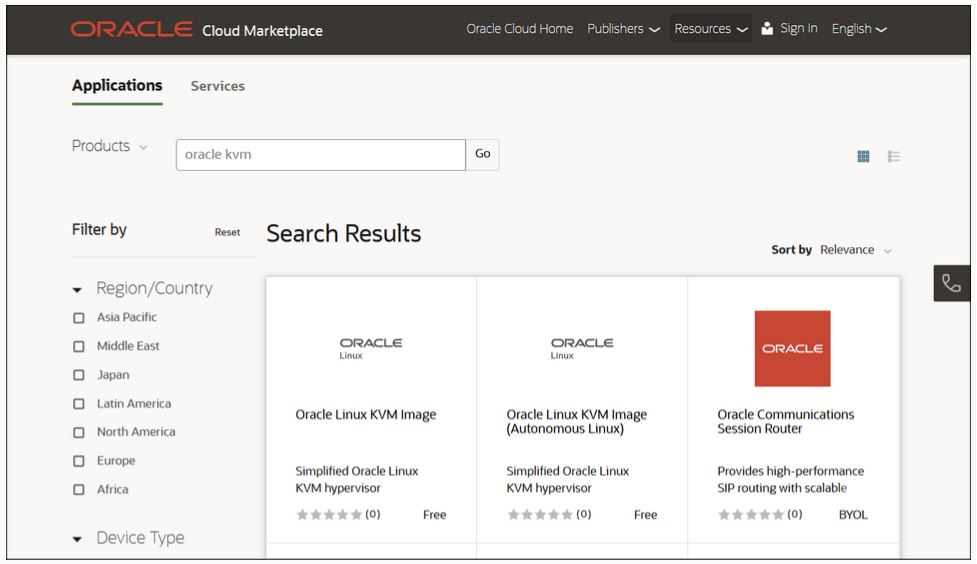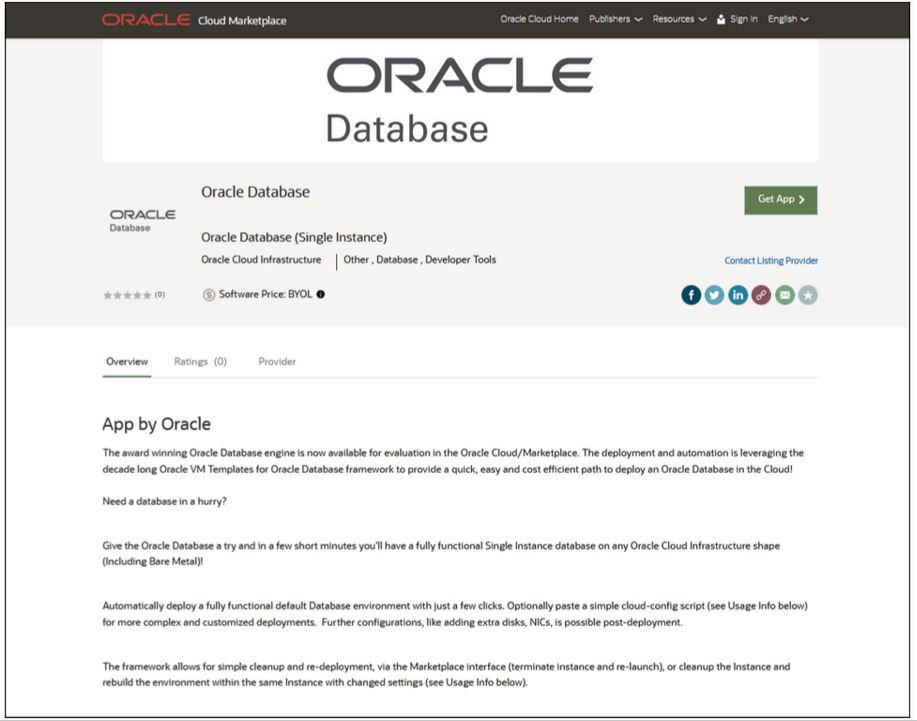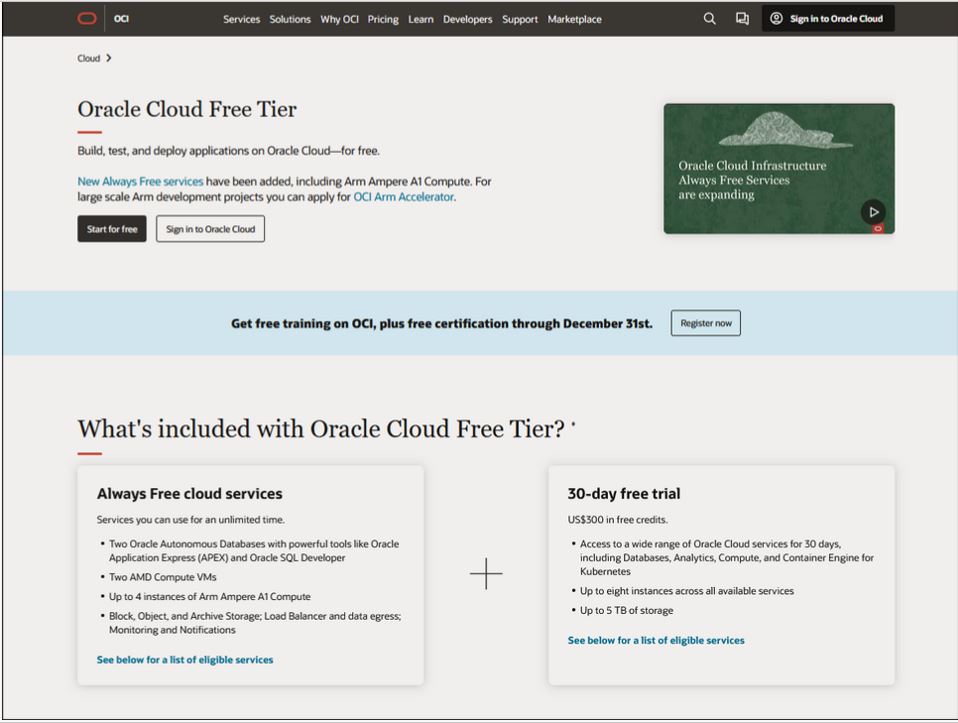Customers looking to simplify procurement, and develop and run applications in Oracle Cloud Infrastructure (OCI) are turning to Oracle Linux-based platform and Oracle Cloud Marketplace images. The OCI platform images catalog provides prebuilt, tested, and validated operating system (OS) images for a range of Intel, AMD, and Ampere Arm-based shapes. Oracle Cloud Marketplace provides commercial and government customers access to an ecosystem of click-to-deploy, tested, and validated solution stack images, provided by Oracle and independent software vendors (ISVs). The OCI platform images catalog and Oracle Cloud Marketplace are embedded in the Oracle Cloud Console and fully automates the deployment of development environments and applications by deploying a set of fully configured resources for the solution, including compute, network, storage, and other services.
Application developers can jump-start development and save time by launching click-to-deploy Oracle Linux-based images in OCI. With a few clicks, Oracle Linux is automatically installed and configured, along with any included image tools and solution software. Instances are up and running within minutes, so you’re productive right away–no need to manually configure instances to work in the cloud, or to resolve compatibility or package dependencies among the included software tools and components.
In this blog, we highlight some key Oracle Linux-based images validated by Oracle that can help you get started quickly in OCI.
Optimized, cloud-ready platform images
Oracle Linux OS platform images are available for deployment on Intel, AMD, and Ampere Arm Compute shapes in OCI. Instance creation is fast and simple using any of the available Oracle Linux 6, 7, and 8 platform images in OCI. These images are optimized and preconfigured to work in OCI. Oracle Linux images feature the Unbreakable Enterprise Kernel (UEK), Oracle’s optimized and highly performant OS kernel for demanding workloads. Oracle Linux images preinstall Oracle Ksplice zero-downtime patching tools and OCI utilities. These utilities are used to simplify block volume and secondary VNIC configuration and retrieve instance metadata and network information.

OS Management is an OCI service that helps greatly reduce complexity and error to deliver increased cost savings, security, and availability of Oracle Linux environments by automating management tasks, such as patching and resource monitoring.
OCI customers receive the highest level Oracle Linux support, Ksplice, and the OS Management service for free, which is a highly cost-effective choice for running Linux applications.
Oracle Linux is fully application binary-compatible with Red Hat Enterprise Linux (RHEL), which also makes it the best and stable alternative to CentOS.
Oracle Autonomous Linux is based on Oracle Linux and helps eliminate complexity and human error to reduce costs. It provides autonomous capabilities, such as automated Ksplice kernel and key user space patching with zero-downtime and known exploit detection, to help keep the OS highly secure and reliable. By using the included OS Management service, you can monitor Autonomous Linux instances for critical events, such as a kernel oops or crashes, and automatically collect and submit the messages and logs needed to debug and provide a root cause analysis of the event.
The Oracle Linux Cloud Developer image is a ready-to-run image that provides a comprehensive out-of-the-box development platform in OCI. This image enables developers to rapidly preinstall, automatically configure, and deploy a comprehensive development environment in OCI that includes a choice of popular languages and tools including Java SE, Python, GraalVM EE, OCI software development kits (SDKs), database connectors, and more. With a few clicks and within minutes, developers can deploy a development environment in OCI with all the tools they need to transition applications and to build new ones on Oracle Linux 8 (x86 and aarch64). Oracle Linux 7 and Autonomous Linux-based Oracle Cloud Developer images are also available in the Oracle Cloud Marketplace.
Fast track deployments with validated Marketplace images
The Oracle Linux KVM image, available in the Oracle Cloud Marketplace, makes it easy to deploy an Oracle Linux KVM host and guest virtual machines (VMs) on OCI. KVM is built into UEK for Oracle Linux by default and enables you to use UEK as a hypervisor. Deploying the Oracle Linux KVM host environment in OCI gives you full control and flexibility to configure and manage your instance as a KVM host for deploying and managing VMs. Tools packaged in the KVM image automate the guest VM creation process and make it simple to manage the host, guests, storage, and networking configurations required for the environment. Oracle Linux and Autonomous Linux-based KVM images are available in the Oracle Cloud Marketplace.

The Oracle Database image is available for evaluation from Oracle Cloud Marketplace. This image uses the Oracle VM templates for Oracle Database framework to provide a quick, easy, and cost efficient path to deploy an Oracle database in the cloud. It lets you install a fully functional single-instance database in an OCI shape with just a few clicks. You can paste a simple cloud-config script for more complex and customized deployments and further configure the instance like adding extra disks and network interface cards (NICs). The Oracle Database image is available on Oracle Linux and Autonomous Linux.

The Oracle Linux STIG image is an Oracle Linux 7 implementation of the Security Technical Implementation Guide (STIG) for OCI. With this image, you can easily create an Oracle Linux instance in OCI that you can configure to match certain security standards and requirements set by the Defense Information Systems Agency (DISA) of the U.S. Department of Defense (DoD). The Oracle Linux STIG image is scanned against the target DISA STIG Security Content Automation Protocol (SCAP) penchmark profile. The resulting SCAP Compliance Checker (SCC) score is published in the documentation.
Oracle Linux Storage Appliance provides a fast and easy way to build NFS and Samba shared storage using NVMe devices or block volumes attached to OCI instances. It utilizes the NFS and Samba features available with Oracle Linux, which are packaged in an appliance developed for OCI. The appliance allows you to create shared file systems using your OCI account with bare metal or VM shaped instances. Oracle Linux and Autonomous Linux-based versions are available.
The Oracle Linux 7 high-performance computing (HPC) image simplifies the deployment of the base system and necessary utilities for HPC clusters using cluster networks or instance pools. It includes Mellanox OFED, network authentication scripts, automatic provisioning utilities, preconfigured OpenMPI and IntelMPI distributions.
Oracle Cloud Marketplace images are also readily available for deployment from the embedded Oracle Images catalog when creating an OCI image in the Oracle Cloud Console.
Explore the options
Whether you’re looking for a highly secure and reliable Linux OS, a supported RHEL-compatible OS without the costly support expenses, a stable CentOS alternative, a quick-launch comprehensive development environment, or to jumpstart an Oracle Database instance, Oracle has a Linux-based image available to help you get started.
It’s free to start and you can scale as you go. Sign up for a free OCI account and utilize OCI services, including Oracle Cloud Free Tier resources.

Oracle Cloud Free Tier provides several Always Free services, including access to Arm-based Ampere A1 Compute resources, with no time limit, and a free trial with US$300 of free credit to use on all eligible OCI services for up to 30 days, whichever is consumed or expires first. OCI Arm Accelerator offers free credits to make it fast and easy to get started if you need a more scalable environment.
For more information, see the following resources:
-
Oracle Linux (web page)
-
Oracle Autonomous Linux (web page)
-
Oracle Linux for Oracle Cloud Infrastructure (datasheet)
-
Oracle Linux for Arm (datasheet)
-
Oracle Linux (documentation)
-
Linux on Oracle Cloud Infrastructure (Oracle Learning Library)